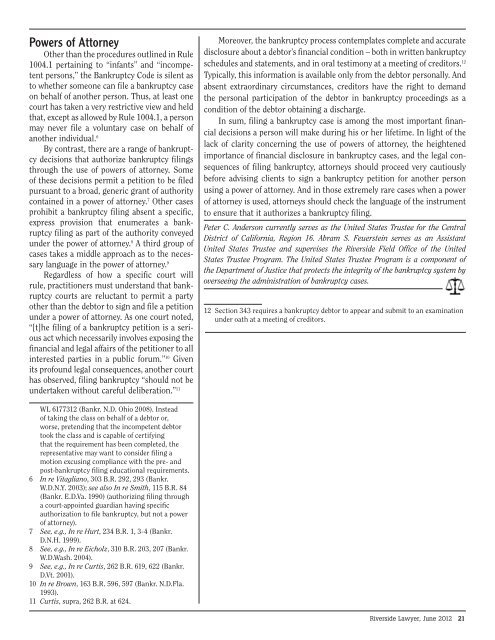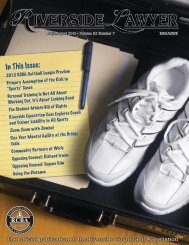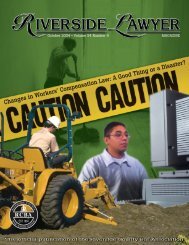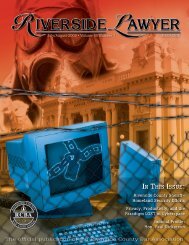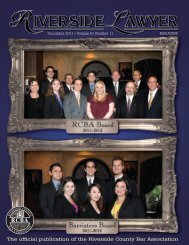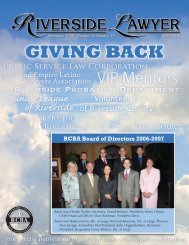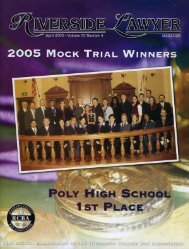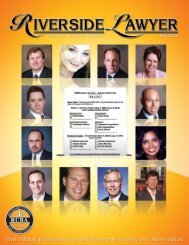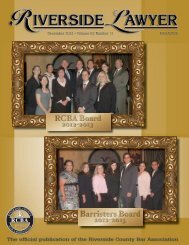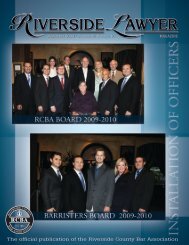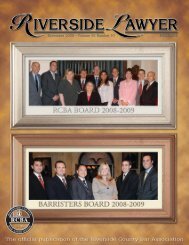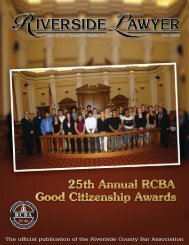In This Issue: - Riverside County Bar Association
In This Issue: - Riverside County Bar Association
In This Issue: - Riverside County Bar Association
You also want an ePaper? Increase the reach of your titles
YUMPU automatically turns print PDFs into web optimized ePapers that Google loves.
Powers of Attorney<br />
Other than the procedures outlined in Rule<br />
1004.1 pertaining to “infants” and “incompetent<br />
persons,” the Bankruptcy Code is silent as<br />
to whether someone can file a bankruptcy case<br />
on behalf of another person. Thus, at least one<br />
court has taken a very restrictive view and held<br />
that, except as allowed by Rule 1004.1, a person<br />
may never file a voluntary case on behalf of<br />
another individual. 6<br />
By contrast, there are a range of bankruptcy<br />
decisions that authorize bankruptcy filings<br />
through the use of powers of attorney. Some<br />
of these decisions permit a petition to be filed<br />
pursuant to a broad, generic grant of authority<br />
contained in a power of attorney. 7 Other cases<br />
prohibit a bankruptcy filing absent a specific,<br />
express provision that enumerates a bankruptcy<br />
filing as part of the authority conveyed<br />
under the power of attorney. 8 A third group of<br />
cases takes a middle approach as to the necessary<br />
language in the power of attorney. 9<br />
Regardless of how a specific court will<br />
rule, practitioners must understand that bankruptcy<br />
courts are reluctant to permit a party<br />
other than the debtor to sign and file a petition<br />
under a power of attorney. As one court noted,<br />
“[t]he filing of a bankruptcy petition is a serious<br />
act which necessarily involves exposing the<br />
financial and legal affairs of the petitioner to all<br />
interested parties in a public forum.” 10 Given<br />
its profound legal consequences, another court<br />
has observed, filing bankruptcy “should not be<br />
undertaken without careful deliberation.” 11<br />
Moreover, the bankruptcy process contemplates complete and accurate<br />
disclosure about a debtor’s financial condition – both in written bankruptcy<br />
schedules and statements, and in oral testimony at a meeting of creditors. 12<br />
Typically, this information is available only from the debtor personally. And<br />
absent extraordinary circumstances, creditors have the right to demand<br />
the personal participation of the debtor in bankruptcy proceedings as a<br />
condition of the debtor obtaining a discharge.<br />
<strong>In</strong> sum, filing a bankruptcy case is among the most important financial<br />
decisions a person will make during his or her lifetime. <strong>In</strong> light of the<br />
lack of clarity concerning the use of powers of attorney, the heightened<br />
importance of financial disclosure in bankruptcy cases, and the legal consequences<br />
of filing bankruptcy, attorneys should proceed very cautiously<br />
before advising clients to sign a bankruptcy petition for another person<br />
using a power of attorney. And in those extremely rare cases when a power<br />
of attorney is used, attorneys should check the language of the instrument<br />
to ensure that it authorizes a bankruptcy filing.<br />
Peter C. Anderson currently serves as the United States Trustee for the Central<br />
District of California, Region 16. Abram S. Feuerstein serves as an Assistant<br />
United States Trustee and supervises the <strong>Riverside</strong> Field Office of the United<br />
States Trustee Program. The United States Trustee Program is a component of<br />
the Department of Justice that protects the integrity of the bankruptcy system by<br />
overseeing the administration of bankruptcy cases.<br />
12 Section 343 requires a bankruptcy debtor to appear and submit to an examination<br />
under oath at a meeting of creditors.<br />
WL 6177312 (Bankr. N.D. Ohio 2008). <strong>In</strong>stead<br />
of taking the class on behalf of a debtor or,<br />
worse, pretending that the incompetent debtor<br />
took the class and is capable of certifying<br />
that the requirement has been completed, the<br />
representative may want to consider filing a<br />
motion excusing compliance with the pre- and<br />
post-bankruptcy filing educational requirements.<br />
6 <strong>In</strong> re Vitagliano, 303 B.R. 292, 293 (Bankr.<br />
W.D.N.Y. 2003); see also <strong>In</strong> re Smith, 115 B.R. 84<br />
(Bankr. E.D.Va. 1990) (authorizing filing through<br />
a court-appointed guardian having specific<br />
authorization to file bankruptcy, but not a power<br />
of attorney).<br />
7 See, e.g., <strong>In</strong> re Hurt, 234 B.R. 1, 3-4 (Bankr.<br />
D.N.H. 1999).<br />
8 See, e.g., <strong>In</strong> re Eicholz, 310 B.R. 203, 207 (Bankr.<br />
W.D.Wash. 2004).<br />
9 See, e.g., <strong>In</strong> re Curtis, 262 B.R. 619, 622 (Bankr.<br />
D.Vt. 2001).<br />
10 <strong>In</strong> re Brown, 163 B.R. 596, 597 (Bankr. N.D.Fla.<br />
1993).<br />
11 Curtis, supra, 262 B.R. at 624.<br />
<strong>Riverside</strong> Lawyer, June 2012 21


